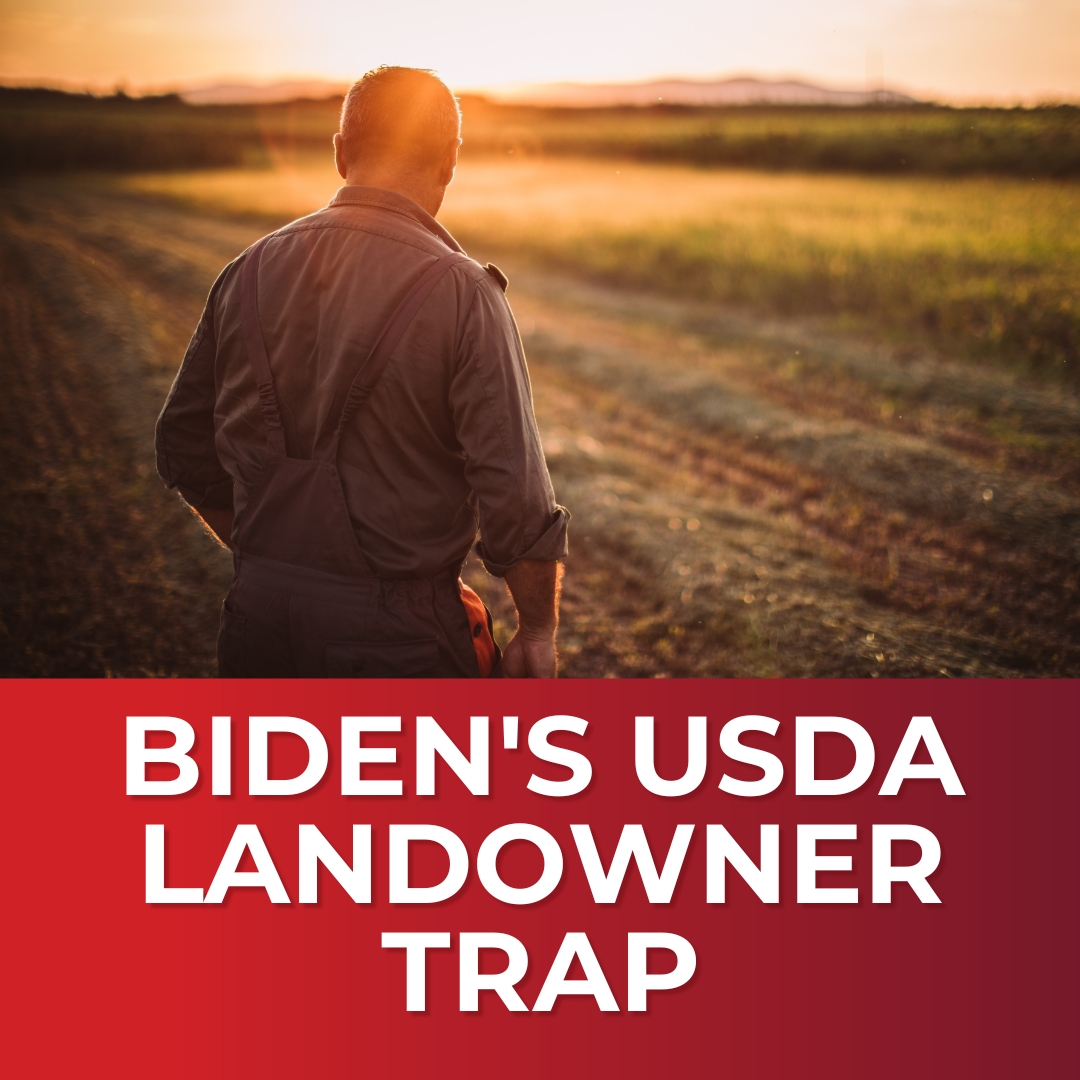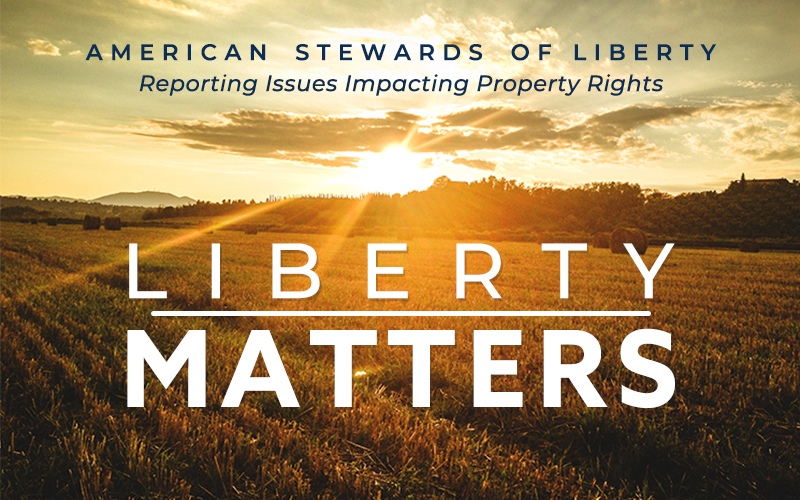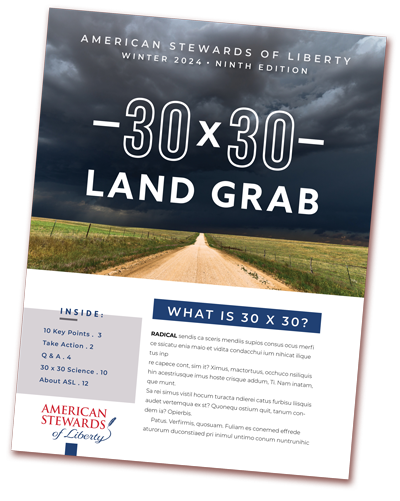The Biden administration continues to set the trap for unsuspecting landowners under the Agricultural Conservation Easement Program (ACEP) as part of “America the Beautiful” agenda better known as the “30×30 Land Grab.”
On September 23rd, the United States Department of Agriculture (USDA) announced, for the second time this year, new funding for the ACEP program to “conserve, restore, and protect wetlands, productive agricultural lands, and grasslands at risk of conversion to non-grassland uses.”
USDA’s Natural Resource Conservation Service (NRCS) is promoting these programs as “climate-smart systems” to mitigate climate-change and claim it is to “safeguard the future of farmers, ranchers, and agricultural communities who depend on and sustain the land as a way of life, especially under a changing climate.”
The new funding for this program comes from the Inflation Reduction Act of 2022, claimed by the Biden administration to be “the largest investment in climate action in history.” This should raise red flags for every landowner considering taking this money.
The Inflation Reduction Act (IRA) included $1.4 billion in additional funding for the ACEP over five years and revised the purpose of ACEP to maximize the reduction, capture, avoidance, or sequestration of greenhouse gas emissions.
Pay close attention to this language. It signifies the changes created by the IRA when a landowner accepts funding under this new ACEP program. Instead of supporting agriculture, its purpose is to control agriculture.
Food Safety Act of 1985
Originally, the ACEP program was created under the Food Safety Act of 1985, in SEC. 1265(b). PURPOSES…. where it reads: (3) protect the agriculture use and future viability, and related conservation values, of eligible land by limiting nonagricultural uses of that land that negatively affect the agricultural uses and conservation values: and (4) protect grazing uses and related conservation values by restoring or conserving eligible land (7U.S.C. 1281).
Inflation Reduction Act of 2022
Now, with the new language from the IRA, the purpose of the program changed to the following: (3) to carry out … the agricultural conservation easement program … (B) subject to the condition on the use of the funds that the Secretary shall prioritize projects and activities that mitigate or address climate change through the management of agricultural production, including by reducing or avoiding greenhouse gas emissions: (IRA, HR 5376 117th Congress)
For this year, the IRA authorized $500 million and $600 million for the fiscal year 2026. This IRA funding is in addition to the funding authorized and available under the Farm Bill.
The IRA changed the purpose of the ACEP program from ensuring the producers’ agriculture viability to giving the federal government control over agricultural production – that is for those who enroll in the easement program.
The IRA-funded conservation contracts must be managed to mitigate climate change at the expense of food production. Whether or not a landowner is meeting this requirement will be determined by the federal government, which retains the right of enforcement through the federal easement, in perpetuity.
They are selling the program as “climate-smart” conservation and are spending billions to convince landowners to voluntarily sign up. The marketing is slick, and the programs are endorsed by trusted agriculture organizations. It is easy to see how landowners could be drawn in.
But there’s more to this story.
As reported in Liberty Matters on August 29, there is another layer to this scheme. The USDA is preparing to implement the Sustains Act authorized through the Consolidated Appropriations Act of 2023.
Under this Act, the government will determine who owns the “environmental services” on private property where there is a conservation program or an easement. The conservation programs subject to the Sustains Act include:
- Environmental Quality Incentives Program
- Agricultural Conservation Easement Program
- Regional Conservation Partnership Program
- Emergency Watersheds Protection Program
- Healthy Forests Reserve Program
- Watersheds Protection and Flood Prevention Act programs (excluding the Watershed Rehabilitation Program)
USDA intends on monetizing environmental services, including air, photosynthesis, pollination, and the health benefits of open space, and claim ownership of these on private properties that have enrolled in the federal conservation programs.
The Sustains Act also provides a way for private entities (environmental organizations) to contribute funds to help implement conservation programs on private land. Under the Act, a private party who contributes funds to implement a conservation program can own a portion of the environmental services on the private lands enrolled.
The White House is also part of this scheme.
In January of 2023, the White House finalized the “National Strategy to Develop Statistics for Environmental – Economic Decisions (SEED)”. This creates a new line-item on the Federal Balance Sheet that will record the value of real assets such as land and water, as well as natural processes such as air and environmental services.
In April of 2024, the White House released the results of four pilot natural asset accounts that explain how they will derive the value of these assets for Federal accounting purposes. These four test accounts cover the elements of land, water, air and environmental services.
Under the Environmental Services pilot test account, they plan to list the value of natural processes derived from private lands where the federal government has funded conservation programs.
This is where the “Sustains Act” becomes one of the implementing components of this strategy. It will create a monetary value for these natural processes derived from the conservation programs, the ownership of which is being decided by the contributing entity and the Secretary of Agriculture – not the private landowner.
All these actions – the Inflation Reduction Act language change, the implementation of the Sustains Act, and the White House addition of environmental services to the Federal Balance Sheet are all working together to transfer the value and control of private property from the citizens to government and environmental organizations.
Agriculture has the power to stop this. Instead of acquiescing to the green new deal, landowners can refuse to enroll. As the USDA continually reminds landowners, all these programs are “voluntary.”
For a deeper dive into the IRA language, read ASL’s IRA Issue Brief.





